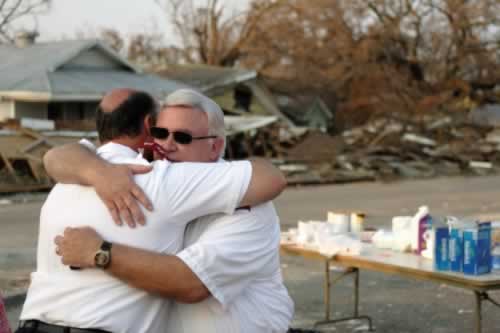Say It With Care: Tips for Talking with Disaster Survivors
Judith Rowland | judith_rowland@uss.salvationarmy.org

It's not easy losing a loved one in an accident. Or surviving a terrorist attack. Or losing your home in a flood or tornado. It’s hard and painful and brutal. Survivors of disasters and crisis situations should never have to face trials on their own. Those around them - particularly their Christian brothers and sisters - should rise up and support them.
It’s also tough being on the outside and trying to help those who are suffering. You don’t know what to do. You want desperately to step in and alleviate some of the pain, but you’re not sure how to begin and you don’t want to say the wrong thing.
The Golden Rule
Generally speaking, you can never go wrong by listening first.
Listening encourages the survivor to express how they feel. The action of telling their story may also give the survivor an important opportunity to examine and process their own thoughts and emotions.
As a listener, be sure to remain attentive to what the listener is saying and use appropriate body language to encourage the speaker to continue. A nod, smile, or short verbal affirmation is important. Avoid interuptions and distractions (such as checking a cell phone).
Never, ever make promises you cannot keep.
What Not To Say
Here are five examples of what not to say, and why:
- “God causes everything to work together for the good of those who love him.” Even though this statement is true, it comes across as pithy and unsympathetic to someone in crisis.
- “Just calm down.” This kind of statement indicates to survivors they should have control over their feelings of stress. In reality anxiety is caused by a biochemical change in the brain, and the survivor cannot control it.
- “You just have to move on.” By saying this you are effectively telling the person to leave their precious memories and people behind. Instead of telling the survivor what they should do, ask them what they need you to do.
- “Have more faith.” Allowing a survivor to be angry, scared, or upset without judgment is the most helpful attitude you can take. As your relationship sufficiently develops, you can gently introduce statements that remind survivors of God’s love.
- “I know how you feel.” This is possibly the worst of all wrong comments! You may have empathy for what has happened, but you do not know exactly how he or she is feeling. Don’t lessen the validity of the survivor’s feelings.
What To Say
By now you’re probably thinking, “What can I say then?!” Here are some good examples of what to say:
- “I don’t know why this happened.” While it may humble us, admitting our ignorance will prevent us from making prideful interpretations that can cause someone in a faith crisis to move further from God.
- “You’re having a normal response to an abnormal event.” It’s necessary to help survivors normalize the emotional, physical, behavioral, and spiritual symptoms they have after a crisis. They will relax faster knowing they are not, in fact, “going crazy.”
- “How can I help you rebuild?” By asking this question, you are making yourself emotionally available in areas where the survivor really needs and wants help. The word ‘rebuild’ can encourage the person to keep moving forward without requiring them to throw away all that came before the disaster.
- “Tell me about what you’re afraid of or worried about.” Often a crisis event can trigger feelings of fear or vulnerability. Even if survivors weren’t seriously injured, the very thought that they could have been hurt or killed can trigger intense fears. Encourage survivors to discuss their fears and concerns.
- “My heart goes out to you. You have my sympathy.” This acknowledges that their story has touched your heart, and that they aren’t alone in feeling pain.
While no one can anticipate every possible scenario or question you might encounter on a disaster site, one resource recommended by The Salvation Army is Group Publishing's Emergency Response Handbook for Disaster Relief. This handy field guide provides information about how to not only “do no harm” but also to bring some comfort and healing in most situations.
Order the guide on Amazon.com, direct from Group Publishing, or through The Salvation Army Trade Department.
About The Salvation ArmyThe Salvation Army annually helps more than 30 million Americans overcome poverty, addiction, and economic hardships through a range of social services. By providing food for the hungry, emergency relief for disaster survivors, rehabilitation for those suffering from drug and alcohol abuse, and clothing and shelter for people in need, The Salvation Army is doing the most good at 7,600 centers of operation around the country. In the first-ever listing of “America’s Favorite Charities” by The Chronicle of Philanthropy, The Salvation Army ranked as the country’s largest privately funded, direct-service nonprofit. For more information, visit www.SalvationArmyUSA.org. Follow us on Twitter @SalvationArmyUS and #DoingTheMostGood.